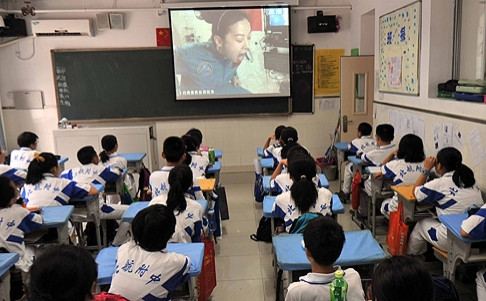Astronauts Teach Chinese Students From Space [VIDEO]

China’s Shenzhou 10 spacecraft has been in orbit 3,000 kilometers above Earth for the past 10 days, carrying a crew of three Chinese astronauts. One of them is China’s second woman in space, Wang Yaping, who broadcast live from space a scientific lecture for students across the country on Thursday.
Thousands of classrooms tuned in so that children could receive a lesson that was literally out of this world. Outfitted in her blue space suit, and accompanied by her fellow astronauts Nie Haisheng and Zhan Xiaoguang, Wang demonstrated various scientific experiments to her eager students on Earth.
The China Daily reports that more than 60 million students and teachers were tuned in to the lesson, in which she demonstrated the difference mass makes in zero gravity, among other things like Newton’s second law of motion and the changed properties of water in space. Students watching the broadcast sat in awe, and even envy.
The full lesson, which can be viewed dubbed in English, can be viewed below.
This is the first time Chinese astronauts have been able to have live contact with China’s public, and they have made a point to document their 15-day trip as much as possible. In celebration of the the Dragon Boat Festival, or Duanwu Jie -- as it is locally known -- the space crew aboard the Shenzhou 10 capsule ate traditional glutinous rice wrapped in bamboo.
While this is was a fun treat for Chinese viewers, NASA Commander Chris Hadfield has easily won the title of creator of most interesting outer-space-related content with his video covering David Bowie’s Space Oddity, complete with guitar in hand. Hadfield’s viral videos, tweets and other space content was said to be part of the inspiration behind China’s decision to broadcast lessons from space.
Though China has been late to the space race, sending its first human into space only in 2003, the developments being made are advancing at great speed. The ambitious program expects to build a station that will orbit Earth by 2020 and also land a person on the moon by then.
© Copyright IBTimes 2024. All rights reserved.





















